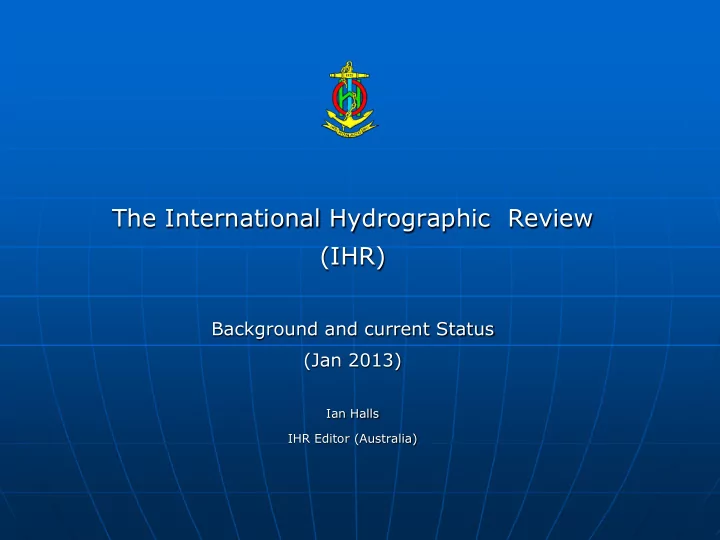

The International Hydrographic Review (IHR) Background and current Status (Jan 2013) Ian Halls IHR Editor (Australia)
Volume 1, Number 1 of The Hydrographic Review was published in March 1923. The Review was published in accordance with Article 55 of the Statutes of the International Hydrographic Bureau dated July 17, 1920 (Article 26 of the Draft Revised Statutes, dated January 1, 1922); no Review was produced at the end of 1921 owing to the short period which had elapsed since the establishment of the Bureau and the consequent scarcity of necessary material.
IHR Publication Details The IHR is currently published bi-annually in May and November. Since 2009, the IHR has been published in PDF and is available free from the IHO website http://www.iho.int/mtg_docs/IHReview/IHR_Intro.htm At the end of each calendar year, the IHB publishes a hard copy compendium of all IHR Articles for the IHO Member States. At the International Hydrographic Conference, the author of the best Article published in the IHR in the past five years, selected by the Member States, will be awarded the Prince Albert Medal.
Purpose of the IHR The IHR is a refereed journal containing relevant and important research, activities and information that is of key importance to the international hydrographic community. It is the flagship publication of the IHO that provides a publishing opportunity by IHO Member States, academics, industry and other learned individuals to share detailed, technical Articles showcasing current work and research activities. No other hydrographic publication provides this level of information. Whilst other high quality hydrographic-specific journals and publications exist, they tend to provide either national information and/or shorter technical and discussion papers.
Topics covered in the IHR include: • Aids and Radio Aids to Navigation • Cartography • Data Management • Geodesy • Hydrographic Offices and other maritime organisations • Hydrographic Training and Technical Assistance • Instrumentation and Equipment • Oceanography – bathymetry, seismic, gravity, magnetism • Positioning Systems and Methods • Maritime Boundaries, Law of the Sea, Resource Management • Sonar technology and methods • Surveying vessels • ECDIS • Tides and Currents • Nautical Publications • Historical, Personal and obituary notices
IHR Production and Administration The production of the IHR is a responsibility of one of the IHB Directors (Mustafa Iptes) and he is supported by: • Editor (contracted position – 2 years) • Editorial Board (volunteers) • IHB production staff Guidelines for the production of the IHR can be found on the IHO website: http://www.iho.int/mtg_docs/IHReview/IHR_Intro.htm
Future Developments • In December 2012, the IHB signed an agreement with HydroMetrica Limited and the University of New Brunswick (UNB) Electronic Text Centre (ETC) to scan 33 IHR issues from 2000 onwards along with 5 years maintenance. The digital versions will be managed using the Open Journal System (OJS). • Ongoing opportunities may exist for the scanning of additional IHR issues. • The OJS also provides the tools to manage the compilation of the issue as it is being prepared. It provides a single point repository for paper submissions, peer review records, communications, document versioning, etc. Adoption of the OJS as a submission management tool provides an improved systems approach to managing the production of the IHR issue. • Scanning of additional IHR issues and the adoption of the OJS for IHR production management is yet to be approved by the IHB.
CONCLUSION 1. The IHR is a publication produced by professionals for their fellow specialists in the Hydrographic Community. 2. Reading it allows readers to benefit from the knowledge and experience of industry and institutes of learning. In particular it allows readers to be aware of the latest technologies in what is a fast changing environment. 3. Reading back numbers also gives a unique and interesting history of hydrography and related subjects. This provides the opportunity to learn from other peoples’ experience. This is particularly valuable for organisations still in the development stage, of which there are several in the ROPME sea area. Remember ‘those who ignore history are condemned to repeat it’.
Thank you for your attention, QUESTIONS
Recommend
More recommend